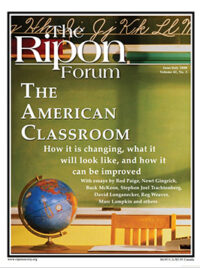Washington produces more reports than any other city on Earth. Most of them, even the good ones, end up collecting dust on a shelf somewhere. Occasionally, one is released that commands attention.
Twenty five years ago this spring, the Reagan Education Department released “A Nation at Risk,” a landmark study that found that America’s educational system was failing our students and, in the process, putting our future in jeopardy.
According to current Education Secretary Margaret Spellings, the study was a “call to arms” for the Nation, one that “began a national movement, inspiring state-level pioneers to think about standards and accountability in education.”
In this edition of the Forum, we examine what this movement has created by looking at the American classroom – how it has changed, what it will look like, and how it can be improved.
We do so with the assistance of some of the most talented thinkers in the field of education today, including former President of George Washington University Stephen Joel Trachtenberg, who assesses U.S. high schools and asks a critical question — are they world class? David Longanecker of the WICHE Institute writes about how schools are changing demographically, while former Education Secretary Rod Paige discusses how the American classroom may change in the future.
Buck McKeon, the lead Republican on the House Education Committee, discusses the need to reauthorize the No Child Left Behind Act, while former Speaker Newt Gingrich argues that the U.S. needs to do more to strengthen math and science education.
We also take a look at the issue of merit pay for teachers with pro/con debate featuring Reg Weaver of the National Education Association and Marc Lampkin of Strong American Schools.
We hope you enjoy this edition of the Forum, and encourage you to write us editor@clu.ccw.mybluehost.me at with any comments or questions you may have.
Bill Frenzel
Chairman Emeritus
Ripon Society




